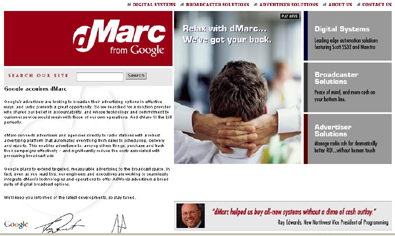Google multi-billion dollar bets in 2007

PART I: Google multi-billion dollar risks in 2007
PART II: GOOGLE MULTI-BILLION DOLLAR BETS IN 2007
Google’s acquisition of dMarc Broadcasting in January was less costly, and less “sexy,” than the high-profile, high-powered takeover of YouTube.
YouTube founders Chad Hurley and Steve Chen famously (or infamously) celebrated the joining together of the two Internet “kings” in their own celebratory YouTube clip-culture video.
dMarc is coincidently also led by a Chad, Chad Steelberg, but the joining together of dMarc and Google was acknowledged in a more dry fashion: “We are bringing together complementary visions of simplicity, efficiency, and accountability to the radio advertising process.”
Radio does not have the marketplace cachet of online video. Nevertheless, Google has a lot more riding on its dMarc investment, than the YouTube deal.
dMARC BROADCASTING ACQUSITION
January 2006: Google will acquire all of the outstanding equity interests in dMarc for total up-front consideration of $102 million in cash. In addition, Google will be obligated to make additional contingent cash payments from time to time if certain product integration, net revenue and advertising inventory targets are met over the next three years. The maximum amount of potential contingent payments is $1.136 billion over the next three years. Since these contingent payments are based on the achievement of performance targets, actual payments may be substantially lower.
Google CEO Eric Schmidt routinely underscores Google’s multi-platform, multi-media worldwide advertising ambitions.
Schmidt is cited in a recent Wall Street Journal interview:
The long-term fantasy is we walk up to you and you give us, say, $10 million and we'll completely allocate it for you across different media and ad types.
Schmidt has publicly said Google should be
“using our advertising system, our targetability, for every form of advertising”… “ultimately our goal at Google is to have the strongest advertising network and all the world's information, that's part of our mission.”
Google seeks to dominate not only online advertising, but offline as well: radio, print, TV…
Google has not succeeded at print advertising, despite multiple “tests” (see “Google $48 billion Print Ads test: fourth time’s the charm?”) and has yet to embark on a formal TV advertising initiative.

Google is publicly and financially committed to radio advertising, though, as I have been chronicling at this Digital Markets Blog, in my countdown to Google Audio Ads.
Since January, Google has been preparing for the official launch of its radio product, Audio Ads, by investing in a direct sales force to call on radio stations and prospective corporate clients.
Google is also building out a first-ever, “Google Ad Creation Marketplace” to support Audio Ads development for small businesses. See “Google Ad Creation Marketplace auditioning radio talent: Exclusive First Look” and “Google Radio NOT AdWords easy: Audio Ads Exclusive” for an exclusive in-depth look at how Google’s new system will function, and its implications for market dynamics.
A Google success in radio advertising would lend credence to Google’s claims of being able to bring “targeted, measurable advertising” to the offline world. If Google can not gain radio advertising market share, at a profit, the outlook for successful diversification dims.
YOUTUBE ACQUSITION
Google has agreed to acquire YouTube for $1.65 billion in a stock-for-stock transaction. Following the acquisition, YouTube will operate independently to preserve its successful brand and passionate community.
Hurley and Chen may equate YouTube with Google as being an Internet “king,” but the royal comparative yardstick for “its successful brand” is not a financial one.
Google is the undisputable leader in search engine usage and monetization, YouTube, however, only leads the online video space in terms of usage by a "passionate,” but non-paying “community.”
In “Web 2.0 success metrics: Revenues, profits in 2007?” I put forth that Web services ought to be focusing on solid, revenue generating business models, rather than simply hoping to gain traction with non-paying users via “cool” apps.
Will Google bring its monetization magic to YouTube? Google has not found the magic financial formula for its in-house Google Video. YouTube commentary continues to tout the value of its “community” to professional content owners, but little is said about how the content will be monetized to the benefit of the video owners and Google.
CBS served to promoYouTube as a promo vehicle for its network shows in Google’s first major post acquisition YouTube press release, but no discussion of monetization was offered, as I analyze in “Google to TV networks: Believe in YouTube” and “Google’s fuzzy YouTube logic.”
NBC and YouTube cross-promoed before Google was involved, but no money changed hands, as I report and analyze in “NBC on YouTube: great for promos, but no money in sight” and “YouTube barter economy: Where is the cash?”
Suzie Reider, CMO YouTube, asserted last month at Ad-Tech that even under Google’s ownership, marketers won’t be “messing up” YouTube anytime soon: “YouTube on marketers: Won’t be ‘messing it up’”
MORE GOOGLE 2006-2007 ANALYSIS:
GOOGLE MULTI-BILLION DOLLAR RISKS IN 2007
GOOGLE PRODUCT HITS & MISSES IN 2006
GOOGLE 2007: MORE GOOGLERS BLOGGING?